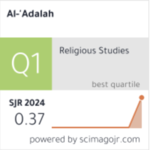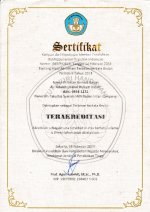The Role of Indonesian Women Ulama Congress (KUPI) in the Search for Gender Equality-Based Islamic Law
Abstract
The Indonesian Women Ulama Congress (KUPI) is an important milestone in integrating the principles of gender equality into the discourse of Islamic law in Indonesia. This Congress not only reflects women's leadership in religious studies but also offers strategies to respond to the challenges of gender inequality that are often legitimized through the interpretation of Islamic law. This study aims to analyze the role of KUPI in developing gender equality strategies through a contextual methodological approach based on maqāshid al-sharīa. This research is classified as qualitative research with a phenomenological approach. Data were collected through document analysis, participant observation, and in-depth interviews with KUPI figures. The analysis combined a critical perspective on societal patriarchal structures and a hermeneutic approach to interpreting religious texts. The results of the study indicate that there are three strategic approaches that KUPI can fight for in fighting for gender equality, namely: (1) reinterpretation of Islamic law that is inclusive of gender issues; (2) community-based advocacy; and (3) strengthening the ulama network. This study concludes that KUPI plays a key role in building a more just Islamic legal paradigm that is not only rooted in Islamic tradition but also in line with human rights principles
Keywords
Full Text:
PDFReferences
Affiah, Neng Dara. “Cerita Dibalik Kongres Ulama Perempuan Indonesia (KUPI),” 2021.
Agustina, Arifah Millati, and Nor Ismah. “Challenging Traditional Islamic Authority: Indonesian Female Ulama and the Fatwa Against Forced Marriages.” Journal of Islamic Law 5, no. 1 (February 29, 2024): 125–46. https://doi.org/10.24260/jil.v5i1.2319.
Ahmad, Abd Kadir. Ulama Bugis. Makasar: Indobis Publishing, 2009.
Avivah, Dewi. “The Importance of the Role of Women Ulama as the Effort to Actualate the Message of Islam to the Value of Equality.” Prosperity: Journal of Society and Empowerment 1, no. 2 (2021): 129–36. https://doi.org/10.21580/prosperity.2021.1.2.8542.
Azyumardi Azra. “Biorgafi Sosial-Intelektual Ulama Perempuan: Pemberdayaan Histiografi,” Pengantar Dalam Buku Ulama Perempuan Indonesia,. Edited by Jajat Burhanuddin (ed.). Jakarta: PPIM IAIN Jakarta dan Gramedia, 2002.
Ensiklopedi Nasional Indonesia,. 17th ed. Jakarta: PT. Cipta Adi Pustaka, 1996.
Faqihuddin Abdul Kodir. Metodologi Fatwa Kupi,. Cirebon: Cirebon: KUPI, 2022.
Ghosiyah, Enok. “ULAMA PEREMPUAN MILENIAL : Wacana Dan Legalitas Gerakan Kongres Ulama Perempuan Indonesia ( KUPI )” 9, no. 01 (2023): 1–20.
Habermas, Jürgen. “The Public Sphere,.” Edited by Kate Nash. Wiley-Blackwell, 2000.
Hanapi, Agustin. “, ‘Peran Perempuan Dalam Islam.’” Gender Equality: Internasional Journal Of Child And Gender Studies 1, no. 1 (2015): 23.
Hefner, R. W. Civil Islam: Muslims and Democratization in Indonesia. Princeton: Princeton University Press, 2000.
Hsubky, Badruddin. Dilema Ulama Dalam Perubahan Zaman. Jakarta: Gema Insani Press, 1995.
Ida Zahara Adibah. “‘Kontribusi Ulama Perempuan Dalam Perkembangan Islam Di Nusantara.’” Jurnal Wahana Akademika: Jurnal Studi Dan Sosial 6, no. 2 (2019): 99–113.
Ismah, Nor. “Destabilising Male Domination: Building Community-Based Authority among Indonesian Female Ulama.” Asian Studies Review 40, no. 4 (2016): 491–509. https://doi.org/10.1080/10357823.2016.1228605.
Istiqlaliyani, Fikriyah. “Ulama Perempuan Di Pesantren: Studi Tentang Kepemimpinan Nyai Hj. Masriyah Amva.” Jurnal Educatio FKIP UNMA 8, no. 1 (2022): 104–9. https://doi.org/10.31949/educatio.v8i1.1670.
Jajat Berhanuddin (ed.). Ulama Perempuan Indonesia. Jakarta: Gramedia dan PPIM IAIN Jakarta, 2022.
Junaidi, Akhmad Arif. “Kongres Ulama Perempuan Indonesia (KUPI) and Mubādalah Approach in Interpreting the Gender Biased-Qur’anic Verses.” Sawwa: Jurnal Studi Gender 18, no. 1 (2023): 1–24. https://doi.org/10.21580/sa.v18i1.17269.
———. “Kongres Ulama Perempuan Indonesia (KUPI) and Mubādalah Approach in Interpreting the Gender Biased-Qur’anic Verses.” Sawwa: Jurnal Studi Gender 18, no. 1 (April 30, 2023): 1–24. https://doi.org/10.21580/sa.v18i1.17269.
Kalis, M. Muslimah Yang Diperdebatkan,. Yogyakarta: Buku Mojok, 2019.
Kloos, David. dan Nor Ismah. “Siting Islamic Feminism: The Indonesian Congress of Women Islamic Scholars and the Challenge of Challenging.” Taylor & Francis Online, no. History and Anthropology (2023). https://doi.org/https://doi.org/10.1080/02757206.2023.2249495.
Kodir, Faqihuddin Abdu. Menguatkan Eksistensi Dan Peran Ulama Perempuan Indonesia (Rencana Strategis Gerakan Keulamaan Perempuan Indonesia Paska KUPI, 2018-2022). Cirebon: Fahmina, 2018.
Kodir, Faqihuddin Abdul. “KUPI,” n.d.
———. Trilogi Fatwa KUPI (2023).
Kupi, Tim. Dokumen Resmi Proses Dan Hasil Kongres Ulama Perempuan Indonesia,. Yogyakarta: KUPI dan Bildung, 2017.
Kusmana. “THE QUR’AN, WOMAN, AND NATIONALISM IN INDONESIA Ulama Perempuan’s Moral Movement.” Al-Jami’ah 57, no. 1 (2019): 83–116. https://doi.org/10.14421/ajis.2019.571.83-116.
M, Rizka Nur Laily. “5 Isu Krusial Kongres Ulama Perempuan Indonesia (KUPI) II, Dorong Keadilan,” n.d.
Ma’ruf, Amrin, Wilodati Wilodati, and Tutin Aryanti. “Kongres Ulama Perempuan Indonesia Dalam Wacana Merebut Tafsir Gender Pasca Reformasi: Sebuah Tinjauan Genealogi.” Musawa: Jurnal Studi Gender Dan Islam 20, no. 2 (2021): 127–46.
Nadia, Zunly. “Ulama Perempuan Dan Moderasi Beragama: Kajian Atas Musyawarah Keagamaan Kongres Ulama Perempuan Indonesia.” Prosiding Konferensi Gender Dan Gerakan … 01, no. 01 (2022): 718–29.
Nisa, Eva F. “Muslim Women in Contemporary Indonesia: Online Conflicting Narratives behind the Women Ulama Congress.” Asian Studies Review 43, no. 3 (2019): 434–54. https://doi.org/10.1080/10357823.2019.1632796.
Prasetiawan, Ahmad Yusuf, and Safitri Lis. “Kepemimpinan Perempuan Dalam Pesantren.” Yinyang: Jurnal Studi Islam Gender Dan Anak 14, no. 1 (2019): 39–69. https://doi.org/10.24090/yinyang.v14i1.2874.
Rahmawati, E S, and M Aprilyanti. “Metodologi Fatwa Kongres Ulama Perempuan Indonesia (KUPI).” Kupipedia.Id, 2017, 1–12.
Rengkaningtias, Ayu Usada. “WACANA KEULAMAAN PEREMPUAN DALAM TEKS IKRAR KEBON JAMBU.” Musawa 17, no. 1 (2018): 282.
Reza Arjmand. “Introduction to Part I: Islamic Educa-Tion: Historical Perspective, Origin, and Foundation,” Handbook of Islamic Education, ( 31. International Hand-books of Religion and Education, 2018.
Rohmaniyah, Inayah, Samia Kotele, and Rr Siti Kurnia Widiastuti. “Reclaiming an Authority: Women’s Ulama Congress Network (KUPI) and a New Trend of Religious Discourse in Indonesia.” Academic Journal of Interdisciplinary Studies 11, no. 3 (2022): 60–70.
Syukur, Yanuardi. “The Rise of Female Ulama in Indonesia:A Gender Perspective.” RISEA 1, no. 1 (2018): 17–27.
Yafie, Helmi Ali. “Prolog: Nasib (Ulama) Perempuan”, in Jejak Perjuangan Keulamaan Perempuan Indonesia,. Edited by Helmi Ali Yafie. Jakarta: KUPI, 2017.
Zaman, Muhammad Qasim. “Ulama” in Islamic Political Thought; An Introduction (In. the United Kingdom: Princeton University Press, 2015.
DOI: http://dx.doi.org/10.24042/adalah.v21i2.23698
Refbacks
- There are currently no refbacks.
Copyright (c) 2024 Nur Faizah dkk
Al-'Adalah is licensed under a Creative Commons Attribution-ShareAlike 4.0 International License.




.png)
_(1).png)
_(1).png)

.png)
